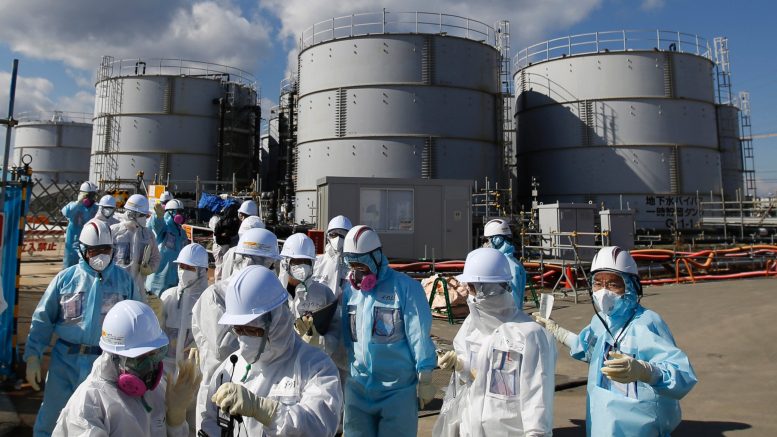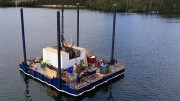In a hastily convened February conference call, CEO Tim Gitzel of Cameco (TSX: CCO; NYSE: CCJ) vowed he would “vigorously pursue remedies to recover value for our shareholders and other stakeholders” after Tokyo Electric Power Co. (Tepco) confirmed it is ending a 2009 uranium supply contract worth $1.3 billion in revenue to the Canadian uranium producer between now and 2028.
The Japanese utility is claiming force majeure, arguing that it has not operated its nuclear plants in Japan for 18 straight months because of tough government regulations enacted after the earthquake and tsunami-related accident at Tepco’s Fukushima nuclear power station in March 2011.
Tepco told Cameco on Jan. 31 not to make its scheduled Feb. 1 delivery — after notifying the Saskatoon-headquartered company on Jan. 24 that it planned to end the contract.
Gitzel rejected Tepco’s claim, calling it “without merit,” and saying that “it is our opinion that Tepco simply doesn’t like the terms they committed to, particularly the price, and want to escape from the agreement.”
Rough calculations by Edward Sterck, an analyst at BMO Capital Markets, puts the average contract price, based on $1.3 billion in potential lost revenues, at US$108 per pound.
For each of 2017, 2018 and 2019 — when Cameco expected to deliver 855,000 lb. uranium to Tepco for annual revenues of $126 million — the average contract price is closer to US$113 per lb., Sterck estimates.

Workers conducting a primary containment vessel investigation in February at Tepco’s disabled Fukushima Daiichi nuclear power station in Japan. Credit: International Research Institute for Nuclear Decommissioning.
Rob Chang of Cantor Fitzgerald says that the entire contract averaged US$107.53 per lb., and the termination would impact Cameco’s bottom line.”
Cameco adds that the revenue loss this year alone could be 6% of the company’s total revenue, which it expects will fall between $2.1 billion and $2.2 billion.
Gitzel listed three reasons why Cameco says Tepco’s force majeure claim is baseless.
First, the utility signed a contract obliging it to take all deliveries, and it had taken deliveries and paid for deliveries in 2014, 2015 and 2016.
Second, Tepco repeatedly said it would restart and run its operable reactors and has taken delivery of uranium under contract, as well as its share of production, from Cameco’s Cigar Lake facility, of which the Japanese utility owns 5%.
Third, Tepco has the ability to pay because it funds its share of the capital and operating costs at Cigar Lake.
“We can’t see how Tepco can claim force majeure due to government regulations when other Japanese utilities have restarted their plants,” Gitzel added, pointing out that nuclear power is not prohibited in Japan and that three reactors operate there now, and seven are approved to restart. The Japanese government also envisions supplying 20–22% of the country’s energy needs with nuclear power by 2030.
Gitzel does not expect other Japanese utilities will follow Tepco’s lead.
“Several operators have met the stringent requirements and have restarted,” he said. “We know they are anxious to show the benefits of safe, clean, nuclear power and restore public confidence in the industry. For that reason, they have taken a commercial approach to restructuring their uranium supply agreements.”
The contract also provides for disputes to be resolved by binding arbitration after good-faith negotiations, and Gitzel reminded participants on the conference call that Cameco had defended its contractual rights against a claim of force majeure in a previous case that went to arbitration in 2014, and expects a similar outcome in the current dispute.
While Cameco declined to give details of the previous dispute, citing confidentiality obligations, it confirmed that the utility involved pointed to government regulations.
“We’ve disclosed that the resolution to that arbitration, which was in our favour, was essentially net pay,” Cameco’s senior vice-president and chief financial officer Grant Isaac said. “Cameco was entitled to the difference between the price the utility was to pay, versus the spot market at the time of the decision. It was aggregated for all the years and discounted back to present value. That’s the remedy we would pursue, in this case.”
During a brief question and answer session, Cameco’s senior vice-president and chief legal officer Sean Quinn confirmed that the Tepco contract was negotiated before the Fukushima nuclear disaster, and contained provisions regarding force majeure and other defences, but said that “we don’t think this is a situation that falls into any of the categories that would excuse Tepco taking deliveries.”
When questioned on how long the arbitration in the current dispute might take, Quinn noted that the previous case took 30 months, which is “not a bad yardstick to use at this time, but it’s early days, and we’re still evaluating.”
Eleven percent of Cameco’s contract book involves Japanese utilities, and Tepco’s contract “is a big portion,” Isaac added, “which is driving the materiality of this disclosure.”
In his research note, BMO’s Sterck pointed out the irony of Tepco calling force majeure. “It was the operator of the Fukushima plant, and yet it is blaming increased government regulation as the issue,” Sterck writes. “It is also notable that the average implied price is a significant premium to the market price, which could point to an opportunistic upgrade of its contract portfolio.”
Cameco’s shares fell 11.2%, or $1.86, closing at $14.71 apiece, on 5 million shares traded.
Cantor Fitzgerald’s Chang lowered his rating on the company from “buy” to “hold,” and cut his target price from $17.10 per share to $15.35 per share.






Be the first to comment on "Japanese utility Tepco ends contract, Cameco to pursue legal rights"